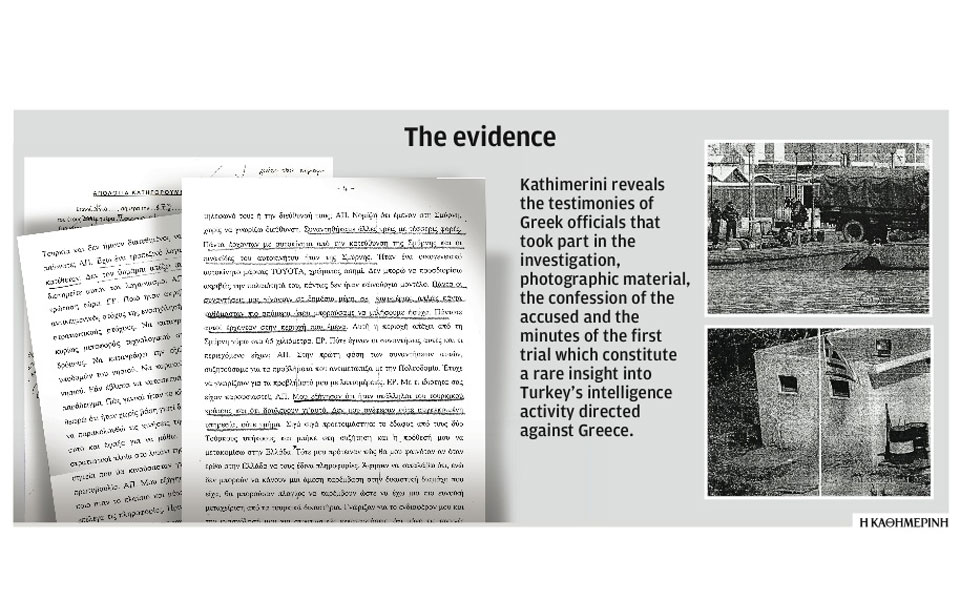Court documents shed light on how German was recruited to spy in Greece

“The first part of the agreement was that we would collect information on the things that the two Turks would tell us. My first task was to put military targets under surveillance, to record troop movements, infrastructure and business activity in order to ascertain whether, for example, any major industrial units were being built.”
On the morning of October 15, 2014, security police on the eastern Aegean island of Kos were alerted to the presence of a man taking photographs of the Portes military guard post from his car. Officers responded immediately and the suspect, a 69-year-old German national, was intercepted a short time later on a rural road near the village of Pyli. A search of his vehicle turned up a pair of binoculars, a telescope, a camera and three memory cards. After a search of his house in the town of Kos, the suspect was arrested and charged with espionage. Two years later, he was found guilty by a mixed jury court on Rhodes and sentenced to 14 years in prison, which he has since been serving on the southeastern Aegean island. Ahead of the start of his appeal this week, Kathimerini brings to light the testimonies of the Greek officers who were involved in the investigation, the suspect’s interrogation and subsequent confession, and the minutes from the first trial – a rare collection of evidence of efforts by Turkey’s National Intelligence Organization (MIT) to spy on Greece.
Background
The 69-year-old had served in the East German army for 11 years between 1970 and 1981, worked at a telecommunications company and then left Germany with his wife after they retired to live in a warmer climate. “We couldn’t go where the rich go because we weren’t rich, so we chose Turkey,” he said in his confession. In 2008 they moved to Yenifoca in the Turkish province of Izmir, where, he claims, they were conned by a crooked real estate agent who took their money and ran off to the Philippines. They became embroiled in a judicial battle with the Turkish state and eventually decided to leave the country in summer 2012 to settle on the Greek island of Kos. “We didn’t want to leave the area of the Aegean because we liked the climate and the atmosphere,” he told the investigators. He was recruited by MIT agents shortly before leaving Turkey and claimed that they used the problems he had with buying a house as a pretext. “I was approached by two people who knew details concerning my situation and had learned – probably from our circle of friends – that we were planning to move to Greece.”
“Both of them spoke German. They didn’t approach me surreptitiously, but at a cafe where I was having a coffee,” he added, describing how he was approached and brought on board. “I think they were living in Izmir but I didn’t know the address. We met another three or four times. Our meetings took place in public places, but we would always sit somewhere that was isolated so we could talk in peace. They gave me to understand that they worked with various retirees in Greece, and especially on the islands. I understood that they had a network of pensioners who gather information and send it to them.”
The Turks paid the 69-year-old 3,000 euros a month, including 1,000 euros for travel and other expenses (like cameras, SIM cards etc). The money was deposited in an account he kept in Germany. He said the Turkish agents were interested in troop movements, the island’s infrastructure and the movements of ships working with the European border agency Frontex that patrol the waters between Greece and Turkey looking for vessels carrying illegal migrants. The agents provided him with a laptop and a USB that looked like a regular storage device but was equipped with special coding software so that he could send them the information he gathered.
The equipment that was found in the 69-year-old’s possession was sent to the digital evidence lab of the Greek Police (ELAS), while it was also evaluated by an colonel in the Hellenic Army who was knowledgeable about such things. The officer told the court that of the 300-odd photographs that were seized, 140 were of military installations, 40 were of bridges and 35-40 were of public infrastructure (telephone antennas, oil tanks etc), while there were also photographs of state services offices. “He knew exactly what he was doing. It takes military knowledge to take these photographs,” the colonel told the court. “They put the country’s interests at risk. The army base’s position can be seen on Google, but not its capabilities.”
After confessing, the 69-year-old German worked with Greek investigative authorities and provided details and explanations to officers of the country’s National Intelligence Service (EYP) who visited him several times in prison.
“I want to state that I am sorry if I have caused any damage to the country’s security and genuinely hope that any real harm caused by my actions is only slight,” he said. “I believe that the information I gave was not very valuable.”
The 69-year-old’s lawyer, Achilleas Daskalakis, told Kathimerini that the defendant sent only a limited number of photographs to the MIT agents and that their content was not classified as it pertained to installations that were in plain sight. He also stressed that his client had no intention of harming Greece’s interests and genuinely regrets his actions. “He cooperated with the Greek authorities and answered all the Greek officers’ questions,” said Daskalakis.
Another German retiree was arrested on charges of spying on Greece for MIT on the island of Chios in August 2013. “When another pensioner was arrested in Greece, [MIT] informed me that I was on leave and shouldn’t do anything,” the 69-year-old said in his confession.





